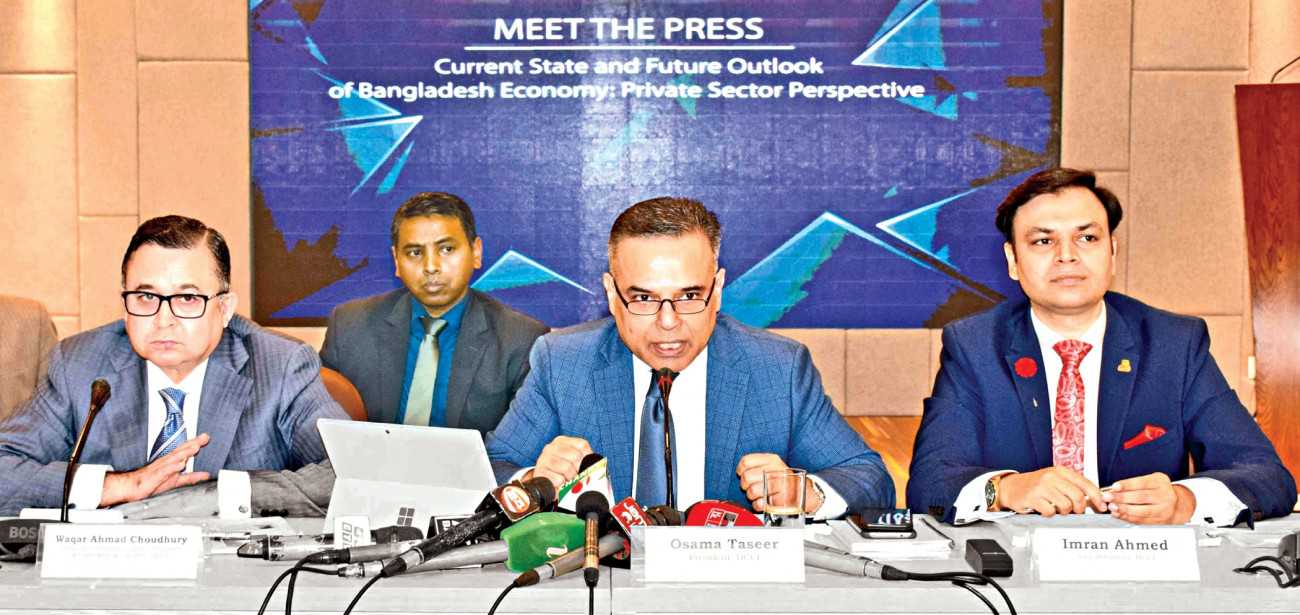Economy not gloomy, but challenges remain: DCCI

Image collected
The current state of Bangladesh’s economy is not gloomy but it faces some major challenges such as rising bad loans, declining exports and stagnant private investment, a leading business chamber said yesterday.
“Some areas of the economy like the banking sector, the stock market, exports of major sectors and inflow of investment by the private sector are not doing well,” said Osama Taseer, president of the Dhaka Chamber of Commerce and Industry (DCCI).
“We have challenges, but we are trying to overcome them positively,” he said, while speaking at a press meet on the current economic issues at the DCCI office in the capital.
Taseer said the prime export-earning garment sector, which accounts for more than 80 percent of the national exports, has been going through difficult times.
Exports slumped more than 17 percent year-on-year to $3.07 billion in October as the strong local currency continued to depress apparel shipments, government data showed.
This is the third consecutive month to witness such a decline.
Recently, some small and medium-sized units have been shut down and a few thousand workers have lost jobs.
“The declining trend of garment shipments indicates that Bangladesh needs to diversify its export basket and should cut dependence on single apparel items,” Taseer said.
Bangladesh’s garment factories have improved safety standards as per recommendations of international inspection and remediation agencies, but buyers are not paying increased prices for the products they source from the country, he said.
According to the chamber, a stagnation in the inflow of private investment is another major challenge for the economy.
Private investment-to-GDP ratio has remained stagnant between 22 and 23 percent for the last six years.
“Inadequate infrastructure and high cost of doing business are posing challenges to the desired private sector investment,” Taseer said.
According to the chamber, the disbursement of industrial term loans rose 0.99 percent year-on-year to Tk 37,482 crore in the first half of 2019. SME loan disbursement stood at Tk 19,905.28 crore during the period.
The DCCI chief cited the rising non-performing loan (NPL) as one of the major challenges. “We have to rein in the NPL.”
NPL stood at Tk 112,425 crore in June, which is 11.66 percent of the total outstanding loans in the banking sector.
Taseer said introducing single digit interest on bank loans is another major challenge.
Although the weighted average lending rate was 9.60 percent in August, most of the banks charged 11 percent to 15 percent interest on term loans for the small industry.
“The current level of inflation and growing NPL are key challenges to bring down the lending rate to single digit.”
He said the government is trying to implement a single digit lending rate which is encouraging. “In order to reach the goal, inflation control, reduced national savings certificate interest rate, and good governance need to be ensured.”
The business leader said a separate mechanism can be developed by the central bank to identify willful and unintentional defaulters which will help banks take necessary measures against NPLs. Shams Mahmud, a director of the DCCI, said Bangladesh’s garment export has been declining mainly because of slowdown in major economies, which are among the country’s prime export destinations.
He said international retailers are placing reduced work orders because of the slowdown in the economies.
Previously, retailers and brands used to place orders for 1 lakh to 2 lakh pieces of garment items at a time, but it has gone now down to 10,000 pieces to 20,000 pieces.
“The work orders have declined substantially although factory owners have invested billions of dollars to improve workplace safety,” he said. As Bangladesh is not a member of the Association of Southeast Asian Nations, it can hardly grab the garment export market in the 10-country bloc, he added.
Source: https://www.thedailystar.net
Previous Story
- Good governance stressed for disciplined financial market
- Credit lines stressed for maximizing export competitiveness
- Industries minister emphasizes improving product, services quality
- Corporate tax: Bangladeshi entrepreneurs pay highest in South...
- DCCI for separate SME bank
- Study suggests formalizing electric vehicles for employment and...
- ATA Carnet System implementation will help boost trade:...
- Jute to be Bangladesh’s future: Jute Minister